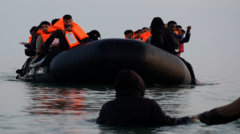Are Smugglers Using Taxi Boats to Pick Up Migrants in the Channel?

The Ongoing Crisis of Migrant Crossings in the English Channel
As the Channel clears, the situation has taken a dramatic turn, marked by a surge of migrants attempting to reach the UK in small boats organized by an expanding network of smuggling gangs. Downing Street has recognized the deteriorating conditions, with French police struggling to keep up with the evolving tactics employed by these smugglers. This article delves deep into the complexities of the situation, highlighting the challenges faced by law enforcement, the experiences of migrants, and the broader implications for both France and the UK.
The Surge of Small Boat Crossings
The English Channel has become a focal point for migration, with increasing numbers of people from various countries risking their lives to reach the UK. French authorities report a significant uptick in small boat crossings, with smugglers adapting their methods to evade police interception. Despite claims from French authorities that they are intercepting more than two-thirds of boats before they even launch, the reality on the ground tells a different story.
Smugglers' New Tactics
Smuggling gangs have become increasingly sophisticated, launching what are being dubbed "taxi boats" from hidden locations far from police patrols. This shift in strategy allows smugglers to operate with greater speed and efficiency. Instead of inflating boats in plain sight, they now utilize concealed areas, making detection much more difficult for law enforcement.
- Launch Points: Gangs are moving away from known departure beaches, often launching from locations dozens of kilometers away.
- Operational Changes: The use of taxi boats allows for a more organized boarding process, reducing the chaos that often leads to dangerous situations.
- Increased Demand: As conditions in home countries worsen, the number of people willing to pay smugglers for risky crossings continues to rise.
The Human Side of the Crisis
The stories of migrants attempting to cross the Channel add a deeply human element to this crisis. Many come from war-torn countries or regions facing dire economic conditions, seeking a better life in the UK. The journey is perilous, often fraught with danger and uncertainty.
Personal Accounts from Migrants
One poignant account is that of Luna, a Somali woman who has attempted to cross the Channel multiple times. Her experiences highlight the physical and emotional toll that such journeys can take. Luna described violent encounters with police, the chaos of boarding boats, and the desperate measures taken by those seeking to escape their circumstances.
Challenges Faced by Women and Children
Women and children face unique challenges in this migration crisis. With the implementation of taxi boat systems, many women find themselves at a disadvantage, struggling to board safely from the water. The desperation to escape often leads to heart-wrenching scenes where families are separated, and loved ones are left behind as the boats depart.
The Role of Law Enforcement
French police have been tasked with patrolling over 120 kilometers of coastline, attempting to intercept smuggling operations before they launch. However, the current rules governing police actions at sea have become a significant obstacle.
Operational Limitations
Colonel Olivier Alary, a key figure in the fight against smuggling, has spoken about the constraints faced by law enforcement. The rules dictate that police can only intervene in life-threatening situations, leading to a frustrating inability to act against smugglers once they are afloat. Officers express concern about the legal ramifications of intervening, fearing prosecution if their actions inadvertently lead to tragedy.
- Intervention Policies: Current policies restrict police action to rescue operations, preventing proactive measures against smugglers.
- Legal Concerns: Officers are wary of potential legal consequences that could arise from intervening in migrant operations.
- Technological Assistance: French authorities have begun utilizing drones and other technology to monitor and track migrant movements more effectively.
The Bigger Picture: Migration Trends and Global Factors
Understanding the current migration crisis requires a broader perspective that considers global trends. Factors such as climate change, economic instability, and political unrest play significant roles in driving people from their homes.
Climate Change and Economic Instability
The effects of climate change are increasingly recognized as a contributor to migration. Natural disasters, resource scarcity, and shifts in agricultural viability force individuals and families to seek refuge elsewhere. In addition, the collapse of economies in various regions leaves many with few options but to embark on dangerous journeys in search of better opportunities.
The UK's Role in the Migration Crisis
Colonel Alary suggests that the UK’s attractiveness as a destination for migrants significantly impacts the influx of people attempting to cross the Channel. With a perception of better job opportunities and living conditions, many see the UK as a "promised land." This notion poses challenges not only for French authorities but also for UK policymakers, who must address the root causes of migration while managing the immediate crisis.
Local Perspectives: Voices from the Community
Local communities along the French coast are feeling the strain of the ongoing migration crisis. Individuals like Stéphane Pinto, the mayor of Ambleteuse, express concerns about the potential for rising tensions between migrants, law enforcement, and local residents.
Growing Tensions
The intersection of migration and local community issues can lead to heightened tensions. Residents often feel overwhelmed by the increasing presence of migrants and the challenges that come with it. Pinto warns that without a concerted effort to address the root causes of migration, the situation could escalate further, leading to violence and division.
- Community Strain: Local residents are increasingly feeling the impact of the migration crisis, leading to frustration and fear.
- Need for Comprehensive Solutions: Experts argue that addressing migration requires a multifaceted approach, considering both local and global factors.
- Future Implications: Without intervention, the ongoing crisis may lead to long-term repercussions for both France and the UK.
Conclusion: Navigating a Complex Crisis
The migration crisis in the English Channel is a complex issue that intertwines human stories with broader geopolitical factors. As smugglers adapt their tactics and the number of crossings rises, both French and UK authorities must find effective strategies to address the situation. The challenges are multifaceted, requiring not only immediate responses but also long-term solutions that consider the root causes of migration.
The urgency of the situation calls for collaboration between nations, local communities, and humanitarian organizations. Only through comprehensive understanding and cooperative effort can we hope to navigate this ongoing crisis and foster a more humane approach to migration.
FAQs
What are the main reasons people migrate across the Channel to the UK?
People migrate for various reasons, including war, political instability, economic hardship, and climate change. The UK is seen as a destination that offers better opportunities for work and living conditions.
How are French authorities responding to the surge in migrant crossings?
French authorities have ramped up patrols along the coastline, utilizing drones and other technology to track smuggling operations. However, legal restrictions limit their ability to intervene once boats are afloat.
What challenges do women and children face during these crossings?
Women and children often face greater difficulties in boarding boats, particularly with the new taxi boat system. Many are left behind as young men scramble to board, increasing their vulnerability during crossings.
As we consider the implications of this ongoing crisis, we must ask ourselves: What steps can be taken to create a more humane and effective approach to migration? #MigrationCrisis #ChannelCrossings #HumanRights
Published: 2025-06-17 21:05:06 | Category: technology



